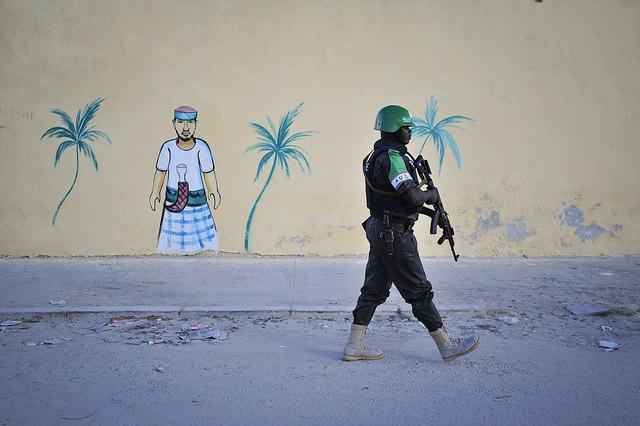Africa: a key battleground in global Islamist jihad
Posted By Sabrina Joy Smith on September 27, 2013 @ 12:30
The African continent is a key battleground in the global Islamist jihad. The horrific terrorist attacks in Kenya this week perpetrated by al-Qaeda affiliate Al-Shabaab tragically highlight this fact. In the interests of Australia’s long-term national security we must, as a country, become more attuned with the threat that Africa-based Islamist militants pose to international security.
This means Australia needs to equip itself with greater knowledge of and increased engagements with our African neighbours. Our foreign policy must be truly global in nature in order to serve our security needs, not narrowly focused on the Asia–Pacific region. It is clearly evident that Islamist terrorist networks and groups have a very global outlook and their engagement with Africa has been astoundingly strategic. In my posts I usually discuss the opportunities which increased engagement with African countries offer Australia, however this must be combined with a focus on the threats which emanate from the region and which further neglect will only exacerbate.
A map of Africa illustrates just too clearly the extent of the threat Islamist militants pose to vast swathes of the continent. The UN Security Council fears the creation of an African ‘arc of instability [2]’ or ‘terrorism arc’ spanning the Sahel and Sahara region and into the Horn of Africa.
The north, west and east of Africa are all facing continuous threats to security and stability from Islamist militant groups, most of which are officially affiliated with al-Qaeda. Recently Mali, Niger, Nigeria, Mauritania, Algeria, Uganda, Somalia and Kenya have suffered violence and threats to security and stability from Islamist militant groups and networks. As we’ve just seen in Kenya, the existence of Islamist militants in one country doesn’t just affect that country, but has the potential to destabilise and terrorise the whole sub-region.
Al-Shabaab claim that their attacks in Nairobi were in retribution for Kenyan army operations in Somalia [3]; they gave a similar motive for their bombings in Uganda in 2010. It’s tragic that the efforts of African states to work through pan-African organisations, such as the African Union, to build improved security, stability and development in their regions, make them prime targets for attack by Islamist militants.
Many African countries are attractive bases and recruiting grounds for Islamist militants. Analysts have long identified that the existence of failed states, if ignored, can become ideal bases for militant groups, as has been the case in Somalia. Unfortunately, the African continent is home to many failed, failing and weak states. Political conflicts and grievances, marginalisation and chronic instability and insecurity are situations Islamists have taken advantage of across Africa. The high levels of extreme poverty and unemployment mean that extremist groups have an easier time recruiting foot soldiers.
Islamist networks and groups are well known to be involved [4] in the lucrative businesses of piracy, hostage taking and drug trafficking throughout the continent. The existence of porous uncontrolled borders and under-resourced and poorly trained law enforcement and security officials exacerbate the ease with which militant Islamists operate on the continent.
It has been reported that Somalia’s Al-Shabaab has been assisting Nigerian based Islamist militant group Boko Haram [5] in their brutal campaign to establish an Islamic state in Nigeria. There’s been a military crackdown on Boko Haram and civilians have even formed vigilante groups to take them on. Boko Haram has been targeting schools and students in its deadly attacks because of its opposition to ‘Western’ education [6]. These tactics are similar to the attacks on schools and students by Islamist militants in Afghanistan and Pakistan. It’s predicted that Al-Shabaab’s cowardly attack on civilians in Nairobi may bring it more support [7] from Islamist militant groups committed to global jihad, who utilise similar terrorist tactics.
It’s interesting to consider that the name of the Malian town, ‘Timbuktu,’ was once used in Australian vocabulary to refer to somewhere faraway, a kind of mythical place; ‘from here to Timbuktu [8]’ was a popular expression used to denote a huge distance. Earlier this year, Mali became the site of a combined international and African effort to combat al-Qaeda affiliated Islamist militants—a campaign that Australia made financial contributions toward.
Today nowhere is far away, insulated or isolated from anywhere else. The world has become smaller and interconnected and this brings both opportunities and increased dangers and security threats. Australia must be prepared for both the good and the bad, and failing to give adequate attention to the African continent will only have negative ramifications for Australia’s long-term national interests.
Sabrina Joy Smith is a PhD candidate with the Centre for the Study of the Great Lakes Region of Africa at the Institute for Development Studies and Management, Belgium. She is currently based in New South Wales. Image courtesy of Flickr user Albany Associates [9].
Article printed from The Strategist: https://aspistrategist.ru
URL to article: /africa-a-key-battleground-in-global-islamist-jihad/
URLs in this post:
[1] Image: https://aspistrategist.ru/wp-content/uploads/2013/09/8161414479_d92b5fd60d_z.jpg
[2] arc of instability: http://www.un.org/News/Press/docs/2013/sc11004.doc.htm
[3] retribution for Kenyan army operations in Somalia: http://www.bbc.co.uk/news/world-africa-24237180
[4] to be involved: http://www.bbc.co.uk/news/world-africa-22700323
[5] assisting Nigerian based Islamist militant group Boko Haram: http://www.aljazeera.com/indepth/opinion/2013/09/al-shabab-global-jihad-terroris-201392484238627603.html
[6] opposition to ‘Western’ education: http://www.theguardian.com/world/2013/jul/14/boko-haram-school-attacks-nigeria
[7] may bring it more support: http://www.reuters.com/article/2013/09/24/us-kenya-attack-shabaab-analysis-idUSBRE98N16620130924
[8] from here to Timbuktu: http://askville.amazon.com/origin-phrase-Timbuktu-coined/AnswerViewer.do?requestId=2723872
[9] Albany Associates: http://www.flickr.com/photos/albanyassociates/8161414479/lightbox/
Click here to print.
